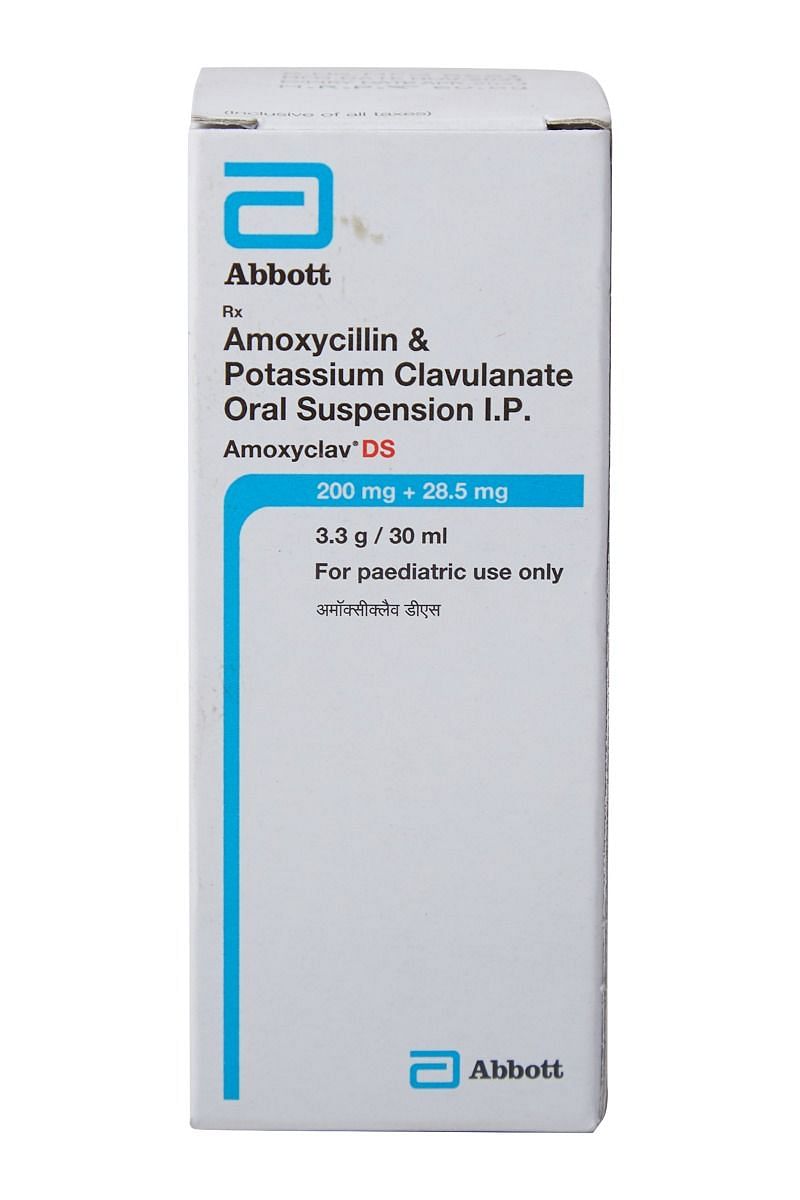
Rapiclav Dry Syrup
Manufacturer
Ipca Laboratories Ltd
Salt Composition
Amoxycillin (200mg) + Clavulanic Acid (28.5mg)
Key Information
Short Description
Rapiclav Dry Syrup is an antibiotic medicine that helps treat bacterial infections of the ear, nose, throat, chest, lungs, teeth, skin, and urinary tract.
Dosage Form
Dry Syrup
Introduction
Rapiclav Dry Syrup is an antibiotic medicine that helps treat bacterial infections of the ear, nose, throat, chest, lungs, teeth, skin, and urinary tract. It is capable of killing bacteria that have become resistant to other therapies and thus also helps treat tuberculosis that is resistant to other treatments.
Directions for Use
Your child must complete the entire course of antibiotics. Stopping too soon may cause the bacteria to multiply again or cause another infection.
Safety Information
Side Effects
Bitter taste in the mouth after intake Diarrhea Itchy rash, facial swelling, or breathing difficulty (stop the medicine and report to the doctor immediately)
How it works
Rapiclav Dry Syrup is an antibiotic. It has two active agents amoxycillin and clavulanic acid. Amoxycillin works by preventing the formation of the bacterial protective covering (cell wall) essential for the survival of the bacteria. Whereas clavulanic acid serves a special purpose of inhibiting an enzyme (beta-lactamase) that is produced by resistant bacteria.
Quick Tips
Your child must complete the entire course of antibiotics Encourage your child to drink plenty of water in case diarrhea develops as a side effect Never give Rapiclav Dry Syrup until and unless prescribed by the doctor Do not give Rapiclav Dry Syrup to treat common cold and flu-like symptoms caused by viruses Check 'expiry' before giving Rapiclav Dry Syrup to your child
Related Medicines

Moxikind-CV Dry Syrup

Advent 228.5mg Dry Syrup Tangy Orange

Amoxyclav Dry Syrup

Mezaclav DS Dry Syrup

Moxaclean Dry Syrup

V Clav Dry Syrup

Subclav Dry Syrup

Saramox CV Dry Syrup

Plymox CV Dry Syrup

Man Clav Dry Syrup
Frequently asked questions
Can other medicines be given at the same time as Rapiclav Dry Syrup?
It is important to consult with your child's doctor before taking any other medications alongside Rapiclav Dry Syrup. They can provide guidance on potential interactions and ensure safe administration.
Can I get my child vaccinated while on treatment with Rapiclav Dry Syrup?
Antibiotics are generally not expected to interfere with the ingredients in vaccines or cause adverse reactions in a child who has recently received one. However, if your child is still sick, it's best to wait until they recover before receiving any vaccines. When the infection subsides, the vaccine can be administered as advised by the doctor.
Which lab tests may my child undergo while taking Rapiclav Dry Syrup on a long-term basis?
During long-term treatment with Rapiclav Dry Syrup, periodic kidney and liver function tests may be necessary to monitor your child's overall health.
Can I give a higher than the recommended dose of Rapiclav Dry Syrup to my child?
It is not recommended to exceed the prescribed dosage of Rapiclav Dry Syrup. Doing so may increase the risk of side effects and potentially worsen your child's condition.
Can I stop giving Rapiclav Dry Syrup to my child when the symptoms are relieved?
No, you must complete the full course of treatment with Rapiclav Dry Syrup even after your child's symptoms improve. The medication may still be providing benefits, and stopping prematurely could lead to incomplete infection resolution.
Can the use of Rapiclav Dry Syrup cause diarrhea?
Yes, Rapiclav Dry Syrup can sometimes cause diarrhea as a potential side effect. It is important to note that this medication works by killing harmful bacteria and can potentially disrupt the balance of good bacteria in the child's digestive system, leading to diarrhea. Encouraging your child to drink plenty of fluids can help alleviate symptoms.
Do all viral common colds result in secondary bacterial infection?
While most viral common colds do not immediately lead to a secondary bacterial infection, it's important to note that the presence of a virus does not guarantee this. Antibiotics should only be used under the guidance of your doctor, as they are ineffective against viruses and can even worsen certain situations.
The mucus coming out of my child’s nose is yellow-green. Is it a sign of a bacterial infection?
Yellow or green mucus in the nasal passage during a common cold is typically normal, and usually signifies that your child's immune system is fighting off the virus. However, if your child experiences any other concerning symptoms like fever, severe cough, difficulty breathing, or sudden onset of discomfort, consult with a doctor immediately.
Is there any sign which shows that my child needs immediate medical attention?
Seek immediate medical attention if your child experiences signs of a serious allergic reaction (difficulty breathing, skin rashes), gastrointestinal symptoms (diarrhea), or liver damage (unexplained weakness, pallor, vomiting). These are uncommon but require prompt medical intervention.


